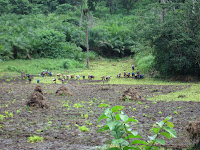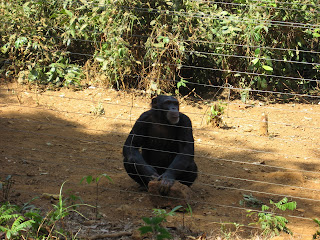Una Kushe,
 After all the formality, we were ready for action, but we got way more than we asked for. The first night that we’d arrived at the Koroma’s house there had been mention of a trip to the neighboring village, Kafugo town, to visit Denis’ father and see the church where he ministered. While we were speaking of this, Denis’ wife, Margaret, let out a high pitched screech. When we pressed her for what the concern was, she told us she was, “thinking of the Monkey Bridge and how much it frightened her.”
After all the formality, we were ready for action, but we got way more than we asked for. The first night that we’d arrived at the Koroma’s house there had been mention of a trip to the neighboring village, Kafugo town, to visit Denis’ father and see the church where he ministered. While we were speaking of this, Denis’ wife, Margaret, let out a high pitched screech. When we pressed her for what the concern was, she told us she was, “thinking of the Monkey Bridge and how much it frightened her.”
 I’m sorry, did you say, Monkey Bridge? Well, yes, that does sound frightening. The morning of our departure, I was amped up for our two mile walk in the blazing sun (oh yes, I will get sunburned like it’s amateur hour, much to the amusement of many little kids who’d never seen sunburn) to Kafugo town. While I knew it would be nice to meet Denis’ father (meeting anyone over 40 here is a big deal) and I was mildly excited about the church, let’s be honest, I was all about crossing that Monkey Bridge, and pretending to be brave while doing it.
I’m sorry, did you say, Monkey Bridge? Well, yes, that does sound frightening. The morning of our departure, I was amped up for our two mile walk in the blazing sun (oh yes, I will get sunburned like it’s amateur hour, much to the amusement of many little kids who’d never seen sunburn) to Kafugo town. While I knew it would be nice to meet Denis’ father (meeting anyone over 40 here is a big deal) and I was mildly excited about the church, let’s be honest, I was all about crossing that Monkey Bridge, and pretending to be brave while doing it.
 Along the road to Kafugo town, we saw subsistence farmers working the fields. We visited Denis’ family (even though his father wasn't home) and his church. We were honored to meet the chief of Kafugo too. We also ran across several curious kids who always refer to us as father (even me, when I am by myself) because normally a white person here is a priest or preacher. And the insect highlight was a lone Scarab beetle, yes, the kind that ancient Egyptians linked to Khepri, the god of the rising sun, simply walking down the road.
Along the road to Kafugo town, we saw subsistence farmers working the fields. We visited Denis’ family (even though his father wasn't home) and his church. We were honored to meet the chief of Kafugo too. We also ran across several curious kids who always refer to us as father (even me, when I am by myself) because normally a white person here is a priest or preacher. And the insect highlight was a lone Scarab beetle, yes, the kind that ancient Egyptians linked to Khepri, the god of the rising sun, simply walking down the road.
Then, Dennis turned abruptly into the brush on the side of the road; we’d reached it, the infamous Monkey Bridge. Constructed of vines using a secret technique in the dead of night by the Gbangbani society, the Monkey Bridge always existed but was often rebuilt or repaired, especially in the heavy rainy season that we were now experiencing.
 It looked like something out of Indiana Jones and the Temple of Doom. I see why Margaret was frightened; she is the one in the town with sense. It got tiny at the center where it passed over gushing water. Although I didn’t look down as advised by Dennis, I did think about the possibility of survival, including the likelihood of animal and parasite attack. After deciding I would surely perish, I’ve concluded that I am certainly braver than Harrison Ford. Where’s my invitation to the Tonight Show?
It looked like something out of Indiana Jones and the Temple of Doom. I see why Margaret was frightened; she is the one in the town with sense. It got tiny at the center where it passed over gushing water. Although I didn’t look down as advised by Dennis, I did think about the possibility of survival, including the likelihood of animal and parasite attack. After deciding I would surely perish, I’ve concluded that I am certainly braver than Harrison Ford. Where’s my invitation to the Tonight Show?
Safu safu,
Mari
Next up: Don’t Humbug Me, Margaret & I Hear from 48 Women of Fadugu
 After all the formality, we were ready for action, but we got way more than we asked for. The first night that we’d arrived at the Koroma’s house there had been mention of a trip to the neighboring village, Kafugo town, to visit Denis’ father and see the church where he ministered. While we were speaking of this, Denis’ wife, Margaret, let out a high pitched screech. When we pressed her for what the concern was, she told us she was, “thinking of the Monkey Bridge and how much it frightened her.”
After all the formality, we were ready for action, but we got way more than we asked for. The first night that we’d arrived at the Koroma’s house there had been mention of a trip to the neighboring village, Kafugo town, to visit Denis’ father and see the church where he ministered. While we were speaking of this, Denis’ wife, Margaret, let out a high pitched screech. When we pressed her for what the concern was, she told us she was, “thinking of the Monkey Bridge and how much it frightened her.” I’m sorry, did you say, Monkey Bridge? Well, yes, that does sound frightening. The morning of our departure, I was amped up for our two mile walk in the blazing sun (oh yes, I will get sunburned like it’s amateur hour, much to the amusement of many little kids who’d never seen sunburn) to Kafugo town. While I knew it would be nice to meet Denis’ father (meeting anyone over 40 here is a big deal) and I was mildly excited about the church, let’s be honest, I was all about crossing that Monkey Bridge, and pretending to be brave while doing it.
I’m sorry, did you say, Monkey Bridge? Well, yes, that does sound frightening. The morning of our departure, I was amped up for our two mile walk in the blazing sun (oh yes, I will get sunburned like it’s amateur hour, much to the amusement of many little kids who’d never seen sunburn) to Kafugo town. While I knew it would be nice to meet Denis’ father (meeting anyone over 40 here is a big deal) and I was mildly excited about the church, let’s be honest, I was all about crossing that Monkey Bridge, and pretending to be brave while doing it. Along the road to Kafugo town, we saw subsistence farmers working the fields. We visited Denis’ family (even though his father wasn't home) and his church. We were honored to meet the chief of Kafugo too. We also ran across several curious kids who always refer to us as father (even me, when I am by myself) because normally a white person here is a priest or preacher. And the insect highlight was a lone Scarab beetle, yes, the kind that ancient Egyptians linked to Khepri, the god of the rising sun, simply walking down the road.
Along the road to Kafugo town, we saw subsistence farmers working the fields. We visited Denis’ family (even though his father wasn't home) and his church. We were honored to meet the chief of Kafugo too. We also ran across several curious kids who always refer to us as father (even me, when I am by myself) because normally a white person here is a priest or preacher. And the insect highlight was a lone Scarab beetle, yes, the kind that ancient Egyptians linked to Khepri, the god of the rising sun, simply walking down the road.Then, Dennis turned abruptly into the brush on the side of the road; we’d reached it, the infamous Monkey Bridge. Constructed of vines using a secret technique in the dead of night by the Gbangbani society, the Monkey Bridge always existed but was often rebuilt or repaired, especially in the heavy rainy season that we were now experiencing.
 It looked like something out of Indiana Jones and the Temple of Doom. I see why Margaret was frightened; she is the one in the town with sense. It got tiny at the center where it passed over gushing water. Although I didn’t look down as advised by Dennis, I did think about the possibility of survival, including the likelihood of animal and parasite attack. After deciding I would surely perish, I’ve concluded that I am certainly braver than Harrison Ford. Where’s my invitation to the Tonight Show?
It looked like something out of Indiana Jones and the Temple of Doom. I see why Margaret was frightened; she is the one in the town with sense. It got tiny at the center where it passed over gushing water. Although I didn’t look down as advised by Dennis, I did think about the possibility of survival, including the likelihood of animal and parasite attack. After deciding I would surely perish, I’ve concluded that I am certainly braver than Harrison Ford. Where’s my invitation to the Tonight Show?Safu safu,
Mari
Next up: Don’t Humbug Me, Margaret & I Hear from 48 Women of Fadugu






































